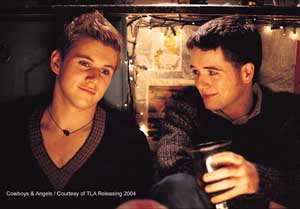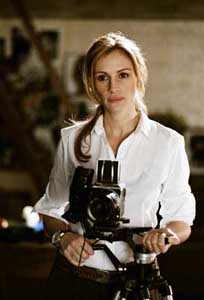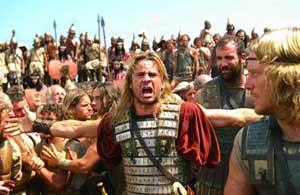-
- Jacques leaves Human Rights Campaign
- Founder of National Lesbian and Gay Journalists Association dies at 70
- U.S. Supreme Court declines to hear same-sex marriage case
- Amid debate on same-sex unions, some conservatives urge broader look at marriage
- An intense biblical debate underlies the politics of same-sex marriage
- Judge rules that both women are legal parents of child
- National News Briefs
- World News Briefs
Arts & Entertainment
Luke-warm to ice cold
Three new love stories with a twist
Published Thursday, 02-Dec-2004 in issue 884
Cowboys & Angels
3 stars
Written and directed by David Gleeson
Starring Michael Legge, Allen Leech, Amy Shiels
In the unremarkable but appealing Cowboys & Angels, written and directed by David Gleeson, nerdy-around-the-edges Shane (sweet Michael Legge) asks the eternal question: “Did you ever feel like something was missing?” Shane is 20, straight, and working at a dead-end civil service job. Inspired by the encouragement of a middle-aged co-worker who feels he wasted his life, Shane moves to the big city of Limerick, Ireland, to find himself. He ends up sharing an apartment with Vincent (cutie Allen Leech, who should seriously consider changing his surname), a former schoolmate who’s gay and studying fashion design. (Now there’s a twist.)
Vincent’s best friend is Gemma (Amy Shiels), a “trendy, sexy, possibly bisexual” babe employed at the fish and chips shop Shane frequents. (She’s got a crush on Vincent, while Shane is ga-ga for her.) After looking over Shane’s drab wardrobe (“You have the sweater problem,” Vincent remarks dryly), Vincent offers to “rebuild” him, which gives Shane the confidence to pursue his secret ambition: to study fashion design. (Why, I kept wondering, does Gleeson keep us waiting for the hookup between Shane and Gemma? Isn’t that why he gets the “Queer Eye” makeover in the first place?) But because he’s broke and needs money for tuition, he agrees to be a one-time drug-runner for a tough-looking neighbor (a tired subplot that seems out of place in a coming-of-age tale).
Though there’s nothing ground-breaking going on here, and I was put off by some of its stereotypical elements (Vincent seems to act queenier as the film progresses, and he has absolutely no sex-life), Cowboys & Angels makes for a breezy, pleasant enough 90 minutes. Guess I’m a sucker for an Irish accent. (starts Dec.10 at Landmark’s Hillcrest Cinemas)
Closer
2.5 stars
Directed by Mike Nichols
Written by Patrick Marber
Starring Julia Roberts, Natalie Portman, Jude Law, Clive Owen
It’s no small achievement that Patrick Marber’s Closer won both the 1997 London Critics’ Circle Award and the Olivier/BBC Award for Best New Play before going on to Broadway, where it was Tony-nominated as Best Play and took the New York Critics Award for Best Foreign Play. And now, seven years later, we have the screen version of the playwright’s very adult exploration of modern relationships, directed by Mike Nichols – hot on the heels of his multiple-award-winning adaptation of Angels in America – and starring the knockout ensemble of Julia Roberts (replacing Cate Blanchett), Jude Law (is there any movie he’s not in this year?), Clive Owen and Natalie Portman. So why, then, is Closer such a letdown?
Marber calls Closer a “nice, simple love story.” I assume he was being tongue-in-cheek (or at least ironic) when he said that, since it is far from “nice” in its language (embarrassingly blue in spots) and attitudes (all relationships are doomed, lovers always lie, etc.), and there is precious little love to be found in its 100 minutes. It’s more of an “out of love” story, really, since Closer is about the beginning and ending of relationships between four gorgeous people, with the middle section of their stories eliminated.
Obituary writer Dan (Law, a brunette this time around) falls for lovely young “waif” Alice (Portman, a standout in this year’s Garden State), whom he meets on a London street when she is grazed by a car (an arresting opening sequence, shot in slow-motion). While on an Internet sex date (arranged by Dan, pretending to be a woman with “epic tits”), horn dog dermatologist Larry (smoldering Owen) makes the acquaintance of – and later marries – beautiful portrait photographer Anna (Roberts, looking great). Each coupling has a passionate start, but after some time (months? years? It’s hard to tell) their relationships begin to unravel in a destructive manner, leading to a change in partners.
Nichols, who achieves an intimacy in certain scenes that simply wouldn’t be possible on stage, is a genius with actors, and Closer is no exception: Owen and Portman are out-and-out fantastic (their explosive scene in the strip club where Alice works is the movie’s highlight), while he brings out the fire lying beneath Law’s chilly, pretty-boy facade. (Roberts is fine, but her role isn’t the flashy, attention-getting sort.) Strangely enough, it’s the writing that proves to be Closer’s undoing. The dialogue is often snappy and tart, but too much of the script (Marber’s first) involves the four characters – all of them rather unpleasant in varying degrees, making it hard to give a damn – standing around, screaming at one another. And with the midsections of their stories excised, much seems to be missing dramatically. When the credits roll, you feel deep dissatisfaction. (playing citywide)
Alexander
1.5 stars
Directed by Oliver Stone
Written by Oliver Stone, Christopher Kyle and Laeta Kalogridis
Starring Colin Farrell, Angelina Jolie, Val Kilmer
Considering the fervor with which Oliver Stone pursued his costly epic about Alexander the Great, it pains me to have to report that Alexander, while nowhere near as bad as advance word would have us believe, is a big, expensive dud which makes Troy look that much better. I knew the film was in trouble the moment I saw a picture of a blond Colin Farrell as the charismatic Macedonian warrior king (New York Times reviewer Manohla Dargis hit it square on the head when she called his “an epically bad dye job”), and I heard Angelina Jolie (as Alexander’s suffocating mother, Olympias) speak in a TV trailer (she sounded an awful lot like a gypsy fortune teller).
By now, we all more or less know Alexander’s story: that he was a visionary (some say tyrant) who never lost a battle, how he had conquered 90 percent – over 2 million square miles – of the known world by age 25, how he drove his loyal troops to the brink of collapse in his attempts to (as the press kit says) “shape the world as we know it today” before dying at the tender age of 32 (the same age as Farrell, interestingly enough). We’ve also heard the reports of Stone’s slavish obsession with production details, and how he wanted to tell the “true” story of this monumental historical figure, right down to his alleged bisexuality (the great love of his life was Hephaistion, played tenderly by Jared Leto), which turned out to be an empty promise. (Hephaistion is repeatedly referred to as Alexander’s “lifelong best friend” in the movie’s publicity materials.)
Like any epic worth its salt, Alexander has towering sets, painstakingly-made costumes and huge, violent battle scenes (often shot in suffocating close-ups by cinematographer Rodrigo Prieto, which all but neuters their power). It also has a terrible script (penned by Stone, Christopher Kyle and Laeta Kalogridis), which overflows with silly, laughable dialogue (“Today we ride to our destiny!” Alexander screams – to his horse) that makes the bad acting (Farrell and Leto aside) seem even lousier. As for how the film deals with Alexander’s love for Hephaistion, it’s the worst kind of cop-out: there isn’t a single kiss between the two men, only brotherly hugs. Who would have thought that the man who made controversial, ballsy films like Natural Born Killers, JFK and Platoon would turn Alexander the Great’s inspirational story into a cowardly, disappointingly conventional costume picture? (playing citywide)
Kyle Counts is the film critic for the Gay & Lesbian Times
|
|
Copyright © 2003-2025 Uptown Publications




